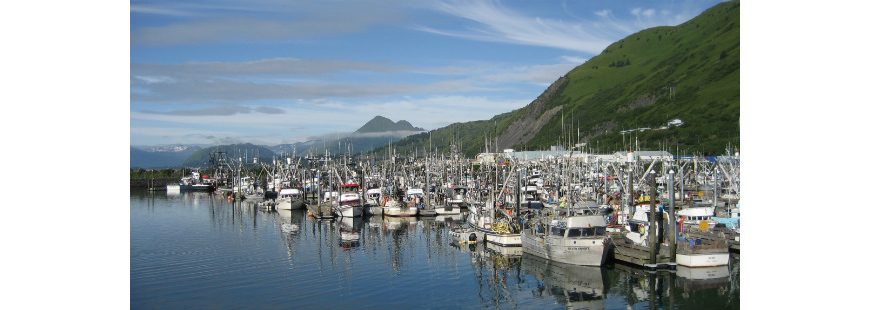Top Photo: Kodiak Harbor Waterfront, Alaska
In early February, Duke University and the Oak Foundation hosted an international workshop focused on supporting small-scale fisheries. I participated in a panel addressing the successes and challenges of small-scale fisheries. Workshop attendees included academics, representatives from the United Nations Food and Agriculture Organization (UNFAO), conservation and rural development foundations, and others involved in supporting or managing small-scale fisheries.
What is a Small-Scale Fishery?
The diversity of operations defies concrete definition, but small-scale fisheries are generally anchored in coastal communities where fishing has a strong cultural history and supports both a livelihood and a way of life. The UNFAO estimate that small-scale fisheries account for more than 90% of the world’s commercial fishermen, processors, and others employed in the supply chain, equivalent to over 108 million people. Roughly half are employed on the oceans, making small-scale fisheries far and away the oceans’ largest employer.
Between 2010 and 2013, the UN FAO facilitated a global process that involved more than 4,000 government representatives, small-scale fishermen, fish workers, researchers, development agencies and other relevant stakeholders from more than 120 countries in 6 regional and more than 20 organization-led national meetings. Guided by these participatory meetings, in 2015 the UNFAO formulated the Voluntary Guidelines for Supporting Sustainable Small-Scale Fisheries. To quote the forward to the guidelines: “These guidelines are the first internationally agreed instrument dedicated entirely to the immensely important – but until now often neglected – small-scale fisheries sector.” The challenge now is to encourage countries around the world to implement these guidelines in support of small scale fisheries.
Although the UN FAO guidelines are focused on small-scale fisheries in developing countries, Alaska’s community-based fisheries certainly fit the small-scale fisheries definition. Alaska’s coastal fisheries are firmly rooted in local communities, traditions, and values. Most coastal fishermen are self-employed and usually provide fish for their own households as well as to other households in their communities. Small-scale fisheries serve “as an economic and social engine, providing food and nutrition security, employment and other multiplier effects to local economies while underpinning the livelihoods of riparian communities.”
The workshop provided me with an opportunity to underscore the importance of small-scale fisheries in Alaska, and to share the Alaska Longline Fishermen’s Association’s contribution to resource management, marine conservation, and local economies. The workshop also allowed me to highlight the challenges that Alaska small-scale fishermen face from industrial fishing through bycatch and habitat impacts. As the workshop reinforced, small-scale fishermen provide a voice for sustainable fisheries and significantly contribute to maintaining local culture, rural economies, human health, and food security in remote areas. Alaska cannot afford to lose its small-scale, community-based fisheries.
Sharing My Thoughts on Small-Scale Fishermen
Anastasia Quintana is a PhD student at Duke’s Nicholas School of the Environment who attended the small-scale fishermen workshop. She interviewed me during the workshop for her blog, THINK, RE-THINK, RE-SOLVE, which focuses on recent world events and scientific findings through a critical social science lens. “Small-scale fisherfolk might be the most plugged-in actors in aquatic systems,” writes Quintana.
Here is an excerpt from her recent blog post:
Quitana: Why should we pay more attention to small-scale fisheries?
Behnken: Small-scale fishermen are tremendously strong voices for sustainable fisheries. They’re people who care about having healthy oceans and productive fisheries to pass on to the next generation. In rural areas, fisheries are often the only source of economic employment for people. There are fishing communities all over the world. The ones I know best are in Alaska, where most coastal communities are remote and off the road system. There is not much else that people can do to support themselves besides fishing. Nearly all Alaska’s coastal communities are off the road system—isolated by hundreds of miles of wilderness and in some cases on islands as well. When people from rural communities lose access, they lose a way of life, they lose self-esteem. We see all sorts of other social issues that flow out of that. So, there’s a social justice piece, there are social equity considerations, and there’s a really strong conservation piece to supporting small-scale fisheries.
You can read the entire interview, “Who is Linda Behnken?” on the Duke University Nicholas School of the Environment website.


